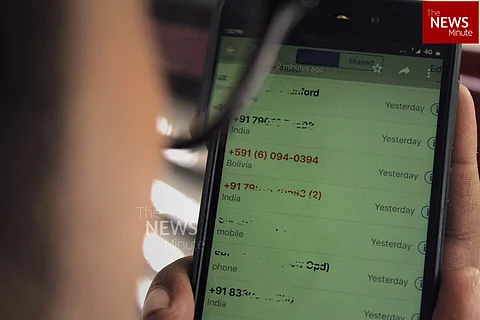

The infamous missed call scam has reached Kerala and even police officials have reportedly been targeted. The scam, that has been brought to the notice of the police in the last couple of days, involves multiple missed calls from an international phone number. When the call is returned the victim of the scam gets billed at premium rates for the call.
Most of the complainants, Malayalis living in and outside Kerala, have got calls from phone numbers starting with the international code +591, that of Bolivia.
The Kerala police, on Saturday, took to Facebook to spread awareness about these scam phone calls, and also advised people not to attend them.
“We have been receiving complaints that a lot of people have been getting calls from Bolivian phone numbers which start with +59. If you receive calls from these number, do not call them back. The Hitech cell has begun the investigation regarding this case,” reads the Facebook post by Kerala police.
Two people, one a Malayali settled in Chennai, and another living in Thiruvananthapuram told TNM that they had received multiple missed calls from a Bolivia number.


Speaking to TNM, an official from the Cyber Police Station in Thiruvananthapuram said, “Most of the complaints we received claim that these numbers which usually begin with +59 will call them a couple of times at first. Naturally, people tend to return the call. And that is when they reported that a huge amount of money was deducted from their call balance in a single call.”
“The people who do not return these missed calls have complained of getting more calls by these foreign numbers,” he said.
“As of now, the complaints we have received are from pre-paid users,” the official added.
But the two people who provided screenshots to TNM were on post-paid connections.
So, what is this scam?
The scam doing the rounds in Kerala is pretty simple: the scammer leaves a missed call and when the call is returned the victim gets charged at premium rates. But these scams are not new to India and have variations in execution.
In one version of the scam, the scammer puts the victim on hold playing an automated music when the call is returned; or the scammer tries to start a conversation with you with the intention of prolonging the call. In both cases, the victim gets billed at premium rates.
A variant of the scam is the Pay Per Call scam where the victim gets a phone call claiming that a family member has been injured or have won a prize.
When asked as to how this menace can be countered, a police official said, “As of now, the best way is to not answer these calls or to return them.”
“From the phone settings, the users can block these numbers. Meanwhile, we are trying to find a way to tackle this menace,” he added.
Umesh Thota, Chief Technology Officer with Authbase, a data security firm said, "Microeconomics is the future of scams as big money can be made by spreading your target pool of victims. The only way people can prevent getting tricked is by blocking incoming international calls if they don't need it."
According to the tech website, Scamwatch.com, these overseas missed call scams are called ‘Wangiri’, a Japanese term which means ‘one and cut’.
How do you protect yourself?
According to the website, some of the preventive measures are:
· If you receive an unexpected missed call from an international number you don’t recognise, ignore it.
· If you are receiving repeated missed calls, block the number.
· Consider blocking international calls on mobiles used by children. This prevents a child from accidentally calling an international number by themselves.
· When dealing with uninvited contacts from people or businesses - whether it's over the phone, mail, fax, email, in person or on a social networking site - always consider the possibility that the approach may be a scam.
Complaints can be filed with the local police or with TRAI's complaint redressal portal.